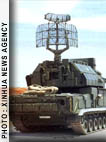Analysis: Cyprus-Russia-Israel Arms Affair Points to Wider Questions
November 22, 2009 3 Comments

TOR-M1 radar
By JOSEPH FITSANAKIS | intelNews.org |
Diplomatic observers were surprised in November 2008, when the then Russian President Vladimir Putin failed to meet his Cypriot counterpart, Dimitris Christofias, during the latter’s official visit to Moscow. Considering the traditionally close bilateral ties between Russia and Cyprus, the excuse from President Putin’s office, that he was too busy attending his United Russia party’s national conference, appeared unconvincing. An article published recently in Greek-Cypriot newspaper O Politis, traced the cause of the Russian President’s apparent snub to a 2007 attempt by the Cypriot government to hand over parts of a Russian-made missile system to Israel. The paper said the Cypriot plan was hatched in response to a request by Israeli intelligence officials, who were interested in acquiring technical insights into the Russian-made TOR-M1 surface-to-air missile defense system. The Israelis were concerned about the TOR-M1 because Iran was also said to be using a variant of the same system, which features a radar apparatus unknown to Israel, the United States or NATO. On the website of the Research Institute for European and American Studies, I explain what this alleged breach of trust between traditional Greek ally Cyprus and Russia may mean for the wider geostrategic balances in the east Mediterranean. Read article →







